ID :
596885
Wed, 04/28/2021 - 14:01
Auther :
Shortlink :
http://m.oananews.org//node/596885
The shortlink copeid
Saudi aspires to good ties with Iran: Crown prince

ISTANBUL
Saudi Crown Prince Mohammed bin Salman said that his country "aspires to have a good and distinguished relationship with Iran”.
Bin Salman's comments came in a televised interview on Tuesday night.
Regarding the position on Tehran, which has been facing repeated Saudi criticism in recent years, the crown prince said, "Iran is a neighboring country and we aspire to have a good and distinguished relationship with it."
"We want a prosperous Iran and to have mutual interests with each other, but our negative problem with it is its negative actions such as its nuclear program or support for outlaw militias in some countries in the region and the ballistic missile program," he said.
"We are working with our partners to deal with this problem, and we hope to overcome it and have a good and positive relationship with everyone."
The Saudi crown prince did not specify details of his talks with the partners, but The Financial Times recently said that a Saudi delegation met an Iranian delegation on April 9 in the Iraqi capital, Baghdad.
The secret Saudi-Iranian talks, according to the same source, focused on easing tensions between the two countries, the Houthi attacks on the kingdom and agreeing to hold a new round of talks.
On the Yemeni issue, the Saudi crown prince said that his country “will not accept the presence of an outlaw militia on its borders,” referring to the Houthi rebel group.
“We hope that the Houthis will sit at the negotiating table with all the poles in Yemen to reach solutions that guarantee the rights of everyone and guarantee the interests of the countries of the region," he said.
For nearly seven years, Yemen has been witnessing an ongoing war between the pro-government forces backed by a Saudi-led Arab military coalition and the Iran-backed Houthis, who have controlled provinces, including the capital, Sanaa, since September 2014.
In response to a question whether Washington has turned its back on Riyadh, he replied that "the margin of disagreement is very natural ... and there is a Saudi consensus with the administration of US President Joe Biden by 90%."
He stated that "the margin of disagreement may increase or decrease with the American administration."
In response to the presence of American pressure on Riyadh, bin Salman affirmed that the kingdom "rejects any interference in its internal affairs," without specifying whether or not there is any pressure.
Bin Salman answered a question about the Saudi campaign against extremism, saying “extremism in everything is not permissible."
On a question about "imprisoning a group of these [extremists]", he said that Saudi Arabia "was a main target for extremist projects because it is the destination of Muslims."
"During the period from the fifties to the seventies of the last century, there were Arabism and socialist projects that gave extremist groups an opportunity to reach various positions in the country that resulted in unpleasant consequences," he said without elaborating.
He continued: "Today we cannot grow and not attract capital and tourism with the existence of an extremist ideology in Saudi Arabia, and therefore this extremist project must be eradicated, ... and any person adopts extremism, it is a crime that is legally pursued."
In September 2017, the Saudi authorities arrested prominent preachers and Islamic activists in the country, most notably Salman al-Ouda, Awad al-Qarni and Ali al-Omari, on charges of “terrorism and conspiracy against the state,” amid demands from international and Islamic personalities and organizations for their release.





